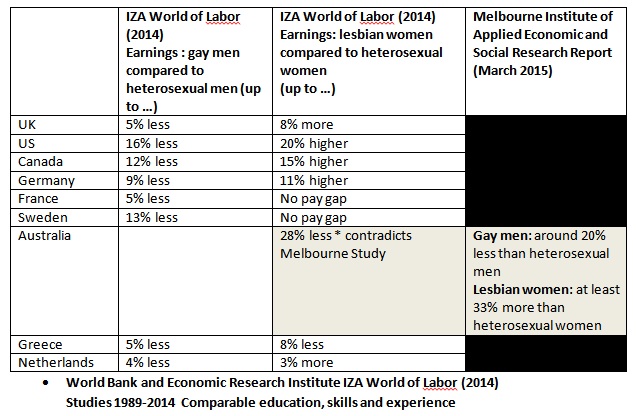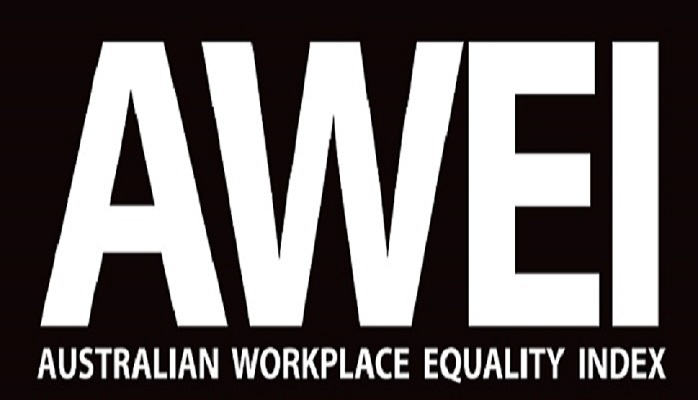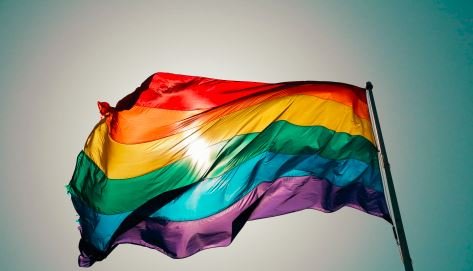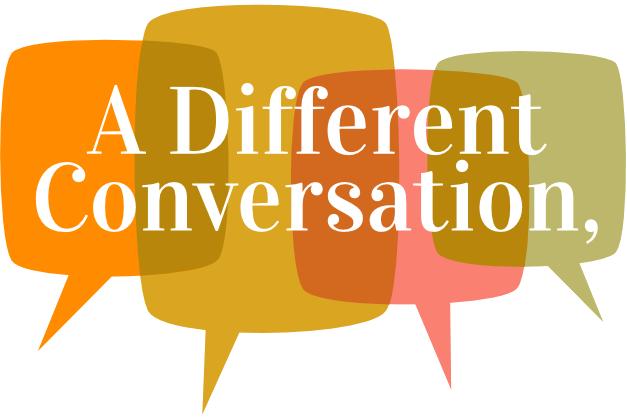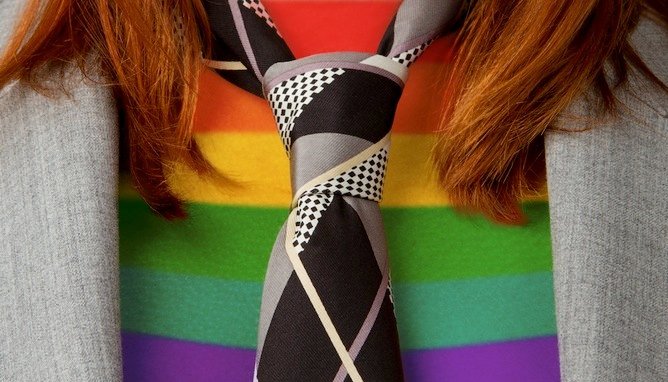
GAY PAY GAP: The impact of orientation on salary & earnings growth
Dawn Hough, Pride in Diversity, Australia
There have been several reports and research studies over the last couple of years reporting on the pay gap between gay men, gay women and their heterosexual counterparts.
In 2014, a study commissioned by World Bank and IZA World of Labor looking into Sexual orientation and labor market outcomes concluded that gay men and lesbians report greater levels of harassment and unfair treatment, as well as the more positive impacts of being out at work in terms of higher job satisfaction and engagement. This is not new to many in the Diversity & Inclusion profession. What was particularly interesting about this report though was the global pay disparity between gay men, lesbian women and their heterosexual colleagues.
The report claimed that average earning differentials disfavoured gay men by up to 9% compared to their heterosexual colleagues; while gay women earned up to a 12% premium in wages compared to their heterosexual counterparts. Studies were undertaken between 1989-2014 comparing individuals of comparable education, experience and skills across several countries. Disparities across countries varied greatly and researchers were quick to point out a substantial variance around estimates.
Differentials quoted included:
The latest study on pay disparity between gay men, lesbian women and their heterosexual counterparts comes out of the Faculty of Business and Economics at the University of Melbourne. The very recent study, published March 2015, was conducted by Professor Mark Wooden (University of Melbourne) and Professor Joseph Sabia (San Diego State University). This study focused on sexual identity, earnings and labour market dynamics with new evidence from longitudinal data in Australia. The data was collected from the 2012 Household, Income and Labour Dynamics Survey (HILDA) and comprised responses from more than 10,000 people.
This study contradicts the findings quoted in the 2 014 IZA study with Australian gay pay disparity being quote as below:
Gay Males in Australia (in comparison to heterosexual counterparts)
- Gay men face up to a 20% earning penalty, partially attributable to earning growth penalties over time
- Gay men experience more frequent gaps in continuous employment
- Earnings decline for gay males open about sexuality at work and in a relationship in comparison to their heterosexual counterparts.
Lesbian Women in Australia (in comparison to heterosexual counterparts)
- Earnings premium of at least 33 per cent
- Attributed to increased labour supply and to a lesser extent, greater earnings over time
- Earnings for those with a partner were found to be higher than those without
Across the two reports, observations and suggestions for the pay disparity include:
Lesbian women
- Many lesbian women not conforming to traditional family roles decide to invest more heavily in education, staying at school longer, undertaking higher degrees
- Lesbian women reported to work longer hours (up to 20%)
- Earnings premium more to do with increased labour supply and to a lesser extent, greater earnings growth over time
- Less lesbian women have family commitments with only 22% of lesbian women having children in comparison to 59% of heterosexual women
Gay men
- Gay male characteristics may be valued less than those of heterosexual men
- Non-conformity to traditional gender roles
- Wages of gay men growing at a much slower rate than those of heterosexual men
- Those who live openly with a partner face larger earning penalties.
In addition to the above explanations, both reports make mention of the role that labour market discrimination plays, particularly in relation to gay men who are “out” at work alongside the diminished chances of job interview selection if resumes reflect one’s orientation. On this, the Melbourne study notes that changing attitudes in Australia between 2000 and 2010 have been quite dramatic with “a 2013 Pew Research Centre poll finding that 80 percent of Australians believed that homosexuality should be accepted by society”.
Over the last five years, Pride in Diversity[1], an Australian not-for-profit member based organisation assisting employers with LGBTI workplace inclusion has witnessed a considerable increase in the number of organisations engaging with Pride in Diversity in order to establish LGBTI inclusion initiatives within their workplaces. Equally, the Australian Workplace Equality Index (AWEI)[2] has since 2010, reported a significant year-on-year change in best practice alignment, bringing Australian organisations at the top of their field to be on par with international best practice.
Given the significant change in attitudes over the last 5-10 years and the explosion of LGBTI inclusion practices onto the Corporate Diversity & Inclusion Agenda, it would be interesting to see the impact of these initiatives on this data over the next five years. With social inclusion, diversity and good corporate citizenship being high on the wish list for incoming graduates and future employees in addition to a more aware and inclusive population, we anticipate that attitudes will continue to change and that stigma and discrimination will play less of a role in pay gap disparity, in particular for gay men.
Just as organisations tracks pay equity for their female population, those active in the work of LGBTI workplace inclusion would gain a great deal by tracking pay equity for their LGBTI populations. Given the difficulty for many LGBTI people to be open about their orientation, gender identity and/or intersex status, the work of breaking down barriers, tackling discriminatory practices and calling non-acceptable behaviour needs to remain high on the agenda. While these figures, particularly for gay men may seem alarming in themselves, we would suggest that those for transgender and openly intersex employees would be significantly higher.
As more and more evidence comes to light in terms of workplace inequity, our younger generations and inclusive employers will become less tolerant of any form of workplace discrimination, bullying and/or harassment. LGBTI workplace inclusion is no longer a nice to have but an imperative for the employer of choice and best practice organisations. This research once again highlights the importance of inclusion initiatives and the ongoing prejudice and discrimination that some LGBTI employees face.
For more information about Pride in Diversity and how the program can benefit your organisation, please contact Stephanie Mellor on (02) 9206.2139 or email Dawn Hough at dawn.hough@prideindiversity.com.au
REFERENCES
Mathew, J (2014), Lesbian employees earn 8% more than straights in the UK, while gay men get 5% less, IB Times referenced at www.ibtimes.co.uk/lesbian-employees-earn-8-more-straights-uk-while-gay-men-get-5-less-1480266
Drydakis, N. (2014), Sexual orientation and labour market outcomes, IZA World of Labor 2014: 111 do: 10.15.185/izawol.111. wol.iza.org
Soderlind, L (20150, Lesbians earn more than heterosexual women while gay men lag in wages, The Melbourne Newsroom, University of Melbourne referenced at: https://newsroom.melbourne.edu.au/news/lesbians-earn-more-heterosexual-women-while-gay-men-lag-wages
Sabia, JJ & Wooden, M (2015), Sexual Identity, Earnings, and Labour Market Dynamics: New Evidence from Longitudinal Data in Australia, Melbourne Institute Working Paper No 8/15, The University of Melbourne; and Institute for the Study of Labor (IZA) https://www.melbourne.institute.com
Dawn Hough is the Director of Pride in Diversity, Australia’s national not-for-profit employer support program specifically designed to assist Australian Employers with all aspects of LGBTI workplace inclusion. Pride in Diversity is also the publisher of the Australian Workplace Equality Index (AWEI), Australia’s definitive national benchmark on LGBTI inclusion. The results of the 2015 AWEI will be announced at the AWEI Awards Luncheon on May 15, 2015. For more information on the AWEI or the Awards Luncheon and associated Top Employer Results, please contact Pride in Diversity.
Pride in Diversity is a social inclusion initiative of ACON, established in 2009 to improve the health and wellbeing of LGBTI people by reducing exclusion, invisibiity, homophobia and stigma in the workplace.
[1] Pride in Diversity is Australia’s national not-for-profit Employer Support Programs specifically designed to assist Australian Employers with all aspects of LGBTI workplace Inclusion. Pride in Diversity is also the publisher of the Australian Workplace Equality Index (AWEI), the national benchmark on LGBTI workplace inclusion and the Top Employer for LGBTI Employees Awards Recognition.
[2] Australian Workplace Equality Index (AWEI) is Australia’s definitive benchmark on LGBTI workplace inclusion providing annual benchmark data across sectors, top employers and in some cases, industry groups. The AWEI comprises an additional employee survey with the 2015 survey canvassing over 9,000 employees working within organisations active in LGBTI workplace inclusion.
